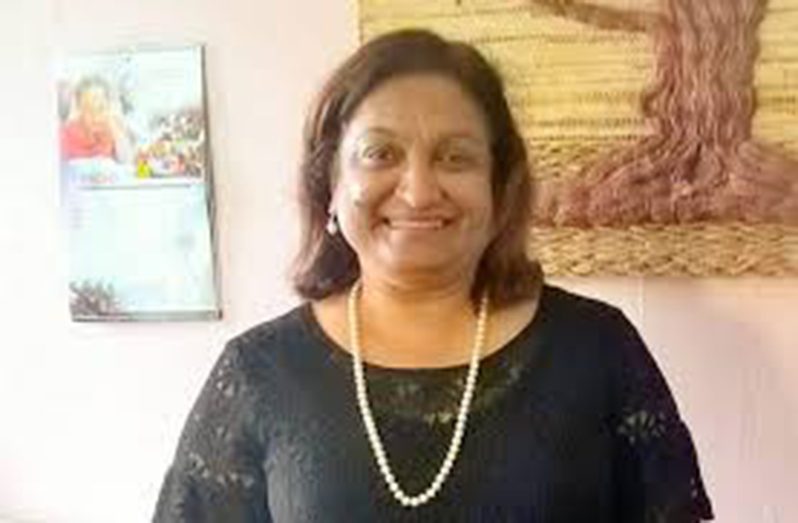OVER the past few months, it has been reported that the COVID-19 pandemic and its ramifications have exacerbated domestic violence, and Chief Executive Officer (CEO) of the Caribbean Family Planning Affiliation, Reverend Patricia Sheerattan-Bisnauth, said a coordinated strategy to protect vulnerable individuals is crucial.
Just recently, 28-year-old Amrita Rahim, a mother of three, was stabbed by her husband. It was reported that the woman was involved in an argument with him and before long, that argument turned deadly.
What happened to Rahim was not an isolated incident. In fact, Minister of Human Services and Social Security, Dr. Vindhya Persaud, said recently that 210,000, or three out of every five women, have experienced some form of violence, either sexually or physically.
Domestic violence has long since been a pervasive issue in Guyana and it has been contended that the pandemic only exacerbated this scourge. Sheerattan-Bisnauth explained that a connection could be made between the ‘lockdown measures’ of the pandemic and the increased frequency of domestic violence cases.
“With an abuser in the house with vulnerable persons like women and children, there is very much likely to be a surge in abuse and we’ve seen it in Guyana,” she explained, in a recent interview with the Sunday Chronicle.
But this is not the only factor which has resulted from the pandemic and may have exacerbated violence in households. The loss of livelihoods, the Reverend said, could also have adverse effects since this may lead to tensions and conflicts.
“There are other social and economic impacts of the COVID-19 pandemic; it has shown up our inequalities, and especially in many homes in Guyana where people have suffered adverse effects due to loss of livelihoods; this has certainly exacerbated difficulties and conflicts in the home because it is very difficult to live in a tense situation,” Sheerattan-Bisnauth said.
It is important to note that while domestic violence is usually used when referring to intimate partner violence, the World Health Organization (WHO) highlighted that the term can also encompass child or elder abuse, or abuse by any member of a household.
Within this pandemic, she lamented, “Children who are vulnerable and are at home we have been hearing about increased sexual abuse of children in their homes because there are more opportunities to do this by perpetrators in the home.”
Cognisant of these factors, the CEO stressed that there must be a coordinated strategy geared at tackling domestic violence. One mechanism, she said, which would help would be to provide relief to the loss of livelihoods. Another would be to focus on how vulnerable individuals, women in particular, have a reduced ability to report instances of violence.
COMMUNITY MOBILISATION
She said that despite rushing to figure how to limit the adverse effects of the developing pandemic in March, discussions on how to protect vulnerable groups should have been had since then. Nevertheless, she posited it is not too late.
Sheerattan-Bisnauth explained that there are already groups and organisations in existence which engage in work which caters for vulnerable groups such as the Guyana Responsible Parenthood Association (GRPA), of which she was an Executive Director; Help and Shelter and Child Link.
“These are the organisations that should be engaged and I think it is really important that this (engagement) be initiated and supported by the government,” she emphasised.
Moreover, she stressed that a coordinated strategy is necessary, since it is a lack of strategy over the past few decades which may have contributed to the limited impact of efforts geared at reducing domestic violence.
“Instead, we are seeing the increases and how bizarre it is,” she lamented also.
Beyond mobilising these groups, she related that community engagement is important as well. When people understand issues and alleviation measures and are empowered to act and provide some assistance, in some way, significant gains can be garnered, she contended.
NO COMPROMISE
Her personal observation of the limited consideration given to vulnerable groups when planning for the pandemic is one which is of concern to her. But when asked if she believes that economic recovery is being prioritised over ensuring citizens’ security, she reasoned that economic recovery is also important.
“I think there has to be an approach where economic recovery is also important because people need to be feeding their children and earning a livelihood… but we also need that concerted effort with the gender considerations to ensure the economic recovery that we’re going for does not kind of compromise the essentials for our people,” Sheerattan-Bisnauth posited.
She continued, “We cannot be compromising what would be so essential to our people’s livelihoods, their safety and their survival.”



.jpg)











